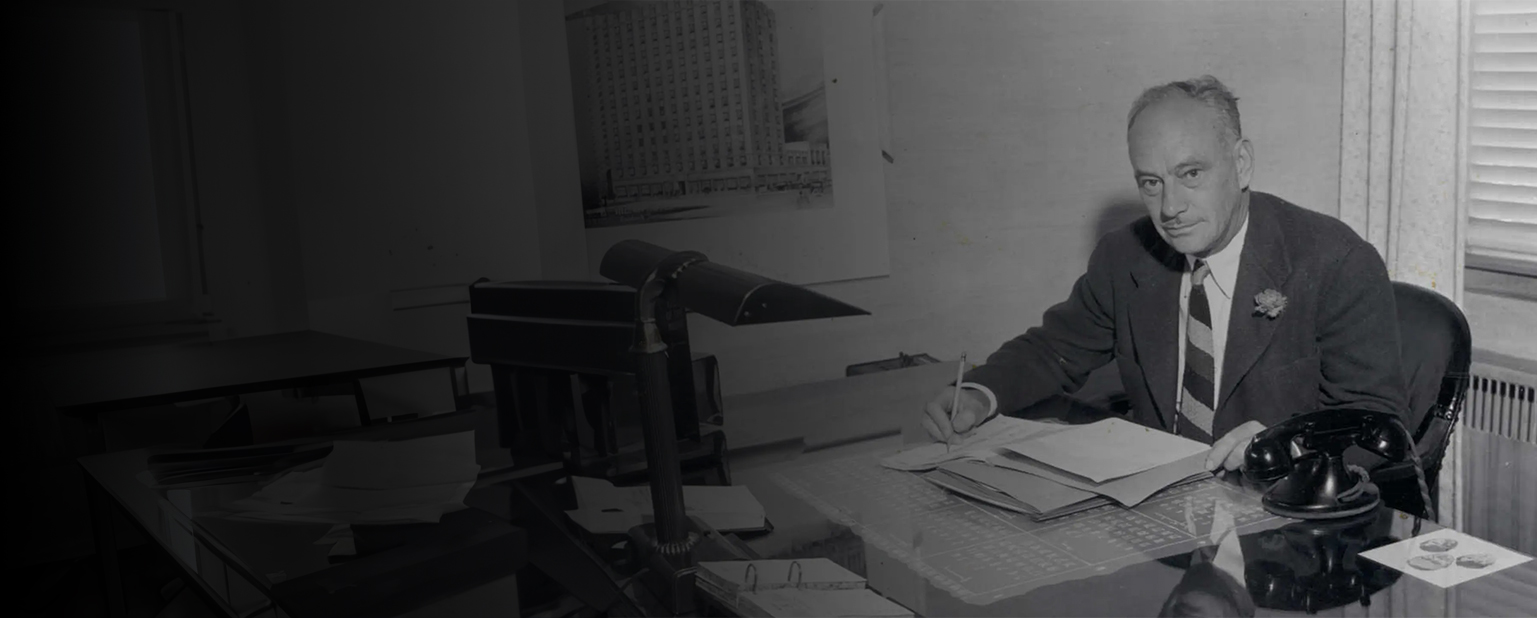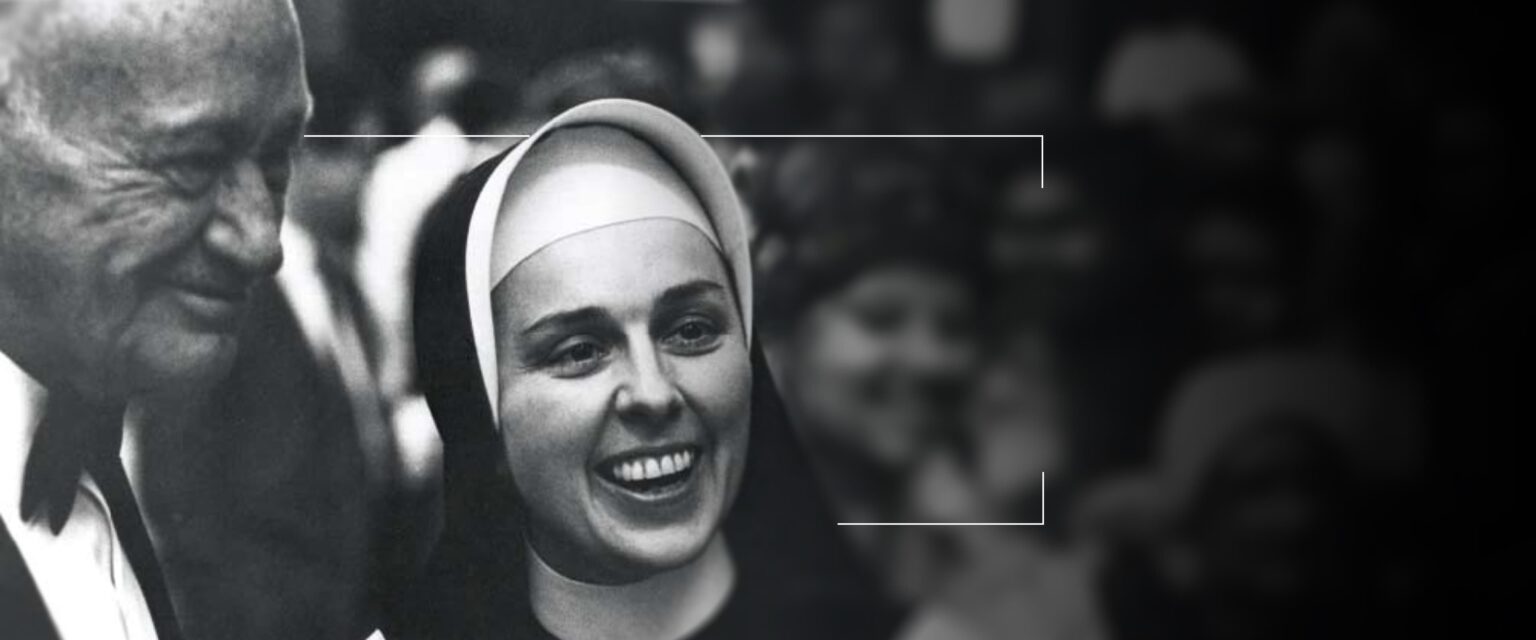

“As the funds you will expend have come from many places of the world, so let there be no territorial, religious, or color restrictions on your benefactions.”
Conrad N. Hilton
Businessman, visionary, and philanthropist Conrad Nicholson Hilton established the Conrad N. Hilton Foundation in 1944 to advance his charitable endeavors and make a difference in the lives of others. His experiences throughout a successful career in the hotel industry provided the vision and the proceeds to establish the Foundation, and he believed firmly in the power of international travel and trade to foster peace and help those in need. Hilton bequeathed his fortune to the Foundation with the aim of alleviating human suffering around the world.
Since its founding, the Hilton Foundation has awarded more than $3.6 billion in grants, including nearly $300 million in 2024. Guided by Conrad Hilton’s spirit of generosity and compassion, the Foundation invests in strategic initiatives and fosters international partnerships, ensuring a lasting and measurable impact on global humanitarian efforts.

Born to humble roots in territorial New Mexico, Conrad N. Hilton became an international business pioneer, epitomizing the American Dream. The son of a German-American mother and Norwegian immigrant father, his life was grounded in a deep faith in God and country, a strong belief in hard work, and the ability to dream big. Before enlisting in World War I, he served his country as a representative in New Mexico’s first state legislature, demonstrating his commitment to service early on. After the Armistice, acting on his mother’s advice to “find your own frontier,” he headed to Texas to buy a bank, but purchased a hotel instead.
Known for his optimism, honesty and unwavering sense of fairness, Conrad Hilton created what would become the era’s largest and most profitable international hotel empire. During the 1919 oil boom, he purchased his first hotel in Cisco, Texas, upon learning that room occupancy turned over three times a day. Thirty years later, his acquisition of the famed Waldorf Astoria hotel in New York City made national headlines. When Hilton Hotels Corporation acquired control of Statler Hotels in 1954 it set a new benchmark as the largest real estate transaction the world had ever seen.
Conrad Hilton’s business acumen was built on a keen understanding of property values, impeccable timing, patience and skill in negotiating, financial savvy and a unique talent for “picking the right man for the right job.” He attributed his success to his guiding philosophy: “man with God’s help and personal dedication is capable of anything he can dream.”
Among industry firsts, Hilton Hotels developed the concept of hotel franchising, launched the first airport hotel, introduced the first multi-hotel reservation system, and became the first hotel chain to span the U.S. coast-to-coast.
In addition to his renown as a leading hotelier, Conrad Hilton distinguished himself as a devoted patriot, international statesman and ambassador of goodwill. He notably hosted the first Congressional Prayer Breakfast in 1953 with President Dwight D. Eisenhower. Throughout his lifetime, he voiced his aspirations for world peace, passionately advocating for international cooperation and championing progress in developing countries.
Conrad Hilton’s concern for the disadvantaged was both genuine and profound, inspiring him to donate and raise significant funds to support key causes. From the Foundation’s inception in 1944 until Conrad Hilton’s passing in 1979, a total of $7.6 million in grants was awarded. In addition, he made generous personal gifts to educational institutions and hospitality education programs, hospitals and programs affiliated with churches of various denominations. He held a special place in his heart for a group that had deeply impacted his life—the Catholic Sisters.
Conrad N. Hilton left his legacy through the foundation that bears his name. In his Last Will, he charged the Foundation with relieving suffering, sheltering the young and supporting the Catholic Sisters, mandating that no religion, race or territory restrict its support. Since then, the Foundation has continued to honor his wishes—noble goals which we transform into tangible actions with the same compassion, innovation, and commitment. Through this shared philanthropic spirit, the Foundation and generations of the Hilton family carry on his enduring legacy of humanitarianism.

“Love one another, for that is the whole law; so our fellow men deserve to be loved and encouraged—never to be abandoned to wander alone in poverty and darkness. The practice of charity will bind us—will bind all men in one great brotherhood.”
Conrad N. Hilton

As a family foundation, our board of directors comprises a majority of Hilton family members. This commitment ensures that Hilton Foundation grants stay true to Conrad N. Hilton and Barron Hilton’s philanthropic vision and responsive to global challenges for generations to come.
Established in 2006, The Generations in Giving (GIG) program provides third, fourth and fifth generation descendants of Conrad N. Hilton the opportunity to engage in our philanthropic efforts, introducing them to the importance of donor intent and the thoughtful art of grantmaking. The program assures that a selection of Hilton family members hold sufficient experience in effective philanthropy, preparing them for a potential future seat on the Foundation’s board.
Beverly Hilton-Neapolitan, current chair of the GIG Committee, actively ensures that our founder’s mission and vision guide today’s leaders and those of tomorrow.
